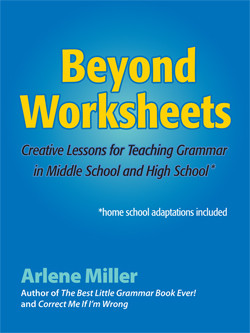The following is a guest post by Joel Syder.
Should you really mix games and grammar? Most teachers say yes. It’s a great mix that gets children to learn effortlessly and without you having to yell or scream to get their attention. It’s also well known that children learn best when playing.
Old teachers might say no to this method because they just don’t want to mess with what works. But language is fun and fluid, and it definitely doesn’t belong in door-stopper textbooks. So, get creative and come up with some games for your classroom. Your students will love it!
Why Use Games?
Grammar isn’t always best studied through traditional methods. It can be a bit dry and boring. However, games make it fresh and exciting, especially for children. Just think about it: after learning all day, students come to your class, but their minds are not ready for more dry information. But you know what they will be ready for? Playing. Their minds will relax and they will learn things with ease.
Here are some of the benefits of using games in your classroom:
- They shake things up — When kids can use something in a fun way, they will definitely remember it and store it with no problems. They will be able to take your messages as fun facts and learn in a way that creates a visual example of what to do. Grammar is boring. But games are definitely not. Plus, your students will love and look forward to your class.
- Games help develop competition — “Grammar games are motivational and they boost competition which is always healthy and good. Students have to strive to be the best, outperform their peers and simply be the best in the classroom,” says Leslie Ruben, proofreading expert at 1Day2write.
- Cooperative learning — When you create teams, you can create a bonding experience between the students and help students with a bit less knowledge learn a lot better. They will all have someone to cheer for them, and that’s one of the best things about this.
- Get energy levels up — Start teaching grammar and you’ll notice that your students doze off. However, introduce a game and your students will all jump with joy and start focusing immediately. Everyone will want to participate.
Amazing Grammar Game Strategies
Here are some of the activities that students could do to have fun and learn at the same time. Keep in mind that you can adapt them to lower or higher levels of knowledge easily.
- Group quiz + personalized sentences
This activity is created for practice stages of the lesson. You have already introduced the rules and language to the students; now you have to allow them to practice. Your goal is to make the rules that you have set memorable. Provide personalized addition to make things even easier to remember. You can put an example on the board and ask for the full sentence from the students. Write their ideas on the board. Ask for personalized verb-noun collocations. They can use it for reference later.
Divide the class into groups and give them a set of quiz cards; allow them to work on their own to complete the cards, for instance, “I would like to be able to cook well” and then on the next, “I am able to play football very well.”
Then when you collect the cards, you can start a quiz where the class would have to guess who wrote the sentence.
- Error correction
“This is a fun game, which can be done quickly and turn errors into a fun and competitive experience. You can create a list of sentences, each having an error and then ask students to find corrections for these sentences. You can either split them into a few teams and create a scoreboard or they can work in pairs,” says Marty Richard, English teacher at Writemyx and Britstudent.
- Team gap fill
This is a short game where the students can revise their lessons. Write sentences with gaps on the board. Divide the classroom into teams and give each a different color marker, create a scoreboard, and start the competition. Each team should give an answer — you can create gaps for this as well. Allow them to discuss their answers amongst themselves, but don’t allow them to discuss this for too long. The game should progress fairly quickly, with some time to reflect on why something is correct or incorrect. Let them write their answers at the same time. Give two points for a perfect answer and one for being close to the solution.
Learning grammar doesn’t have to be that hard. It can be a fun activity for you and your students. Use some of these techniques to make your lessons easy to remember and fun for the entire classroom.
Joel Syder works as an online English tutor and education writer at Academic Brits and Origin Writings. He enjoys helping people  learn English language online as well as creating articles about things that excite him for Australia2write, academic service.
learn English language online as well as creating articles about things that excite him for Australia2write, academic service.
From the Grammar Diva
Having taught 7th grade English for 11 years, I completely agree with this post. Grammar is dry, but if you spice it up with some games nd competition, kids can enjoy it. I don’t remember quite how I figured this out, but I started using games early on….I never thought of them being good until my student teacher suggested I put them all in a book. So I did. I have an e-book of about 25 games I used for grammar. It hasn’t done much on Amazon, but it has done well on a site called Teachers Pay Teachers, where it has many great reviews. Here are a few more suggestions for games:
I used to play Parts of Speech Jeopardy with the class, divided into two big teams. All my stuff was low tech, so I made the game on my whiteboard. Students took turns choosing a lettered column and a dollar value. The bigger the value, the harder the question. I had all the questions, so I read the question, and if the student to it right, the team got that dollar value. If a person on neither team got it right, the team who had the question originally could work together to come up with the answer. They loved this game.
To get ready for Greek and Latin roots test, I would play bingo. I would hand out the boards and put the list of the 25 roots on the whiteboard. They filled in their boards however they wanted to. One by one, I would read the definition of the root. They would find where it was on their boards and X it out. When they got bingo, the first several would get candy. And there was NO free space!
Like the games in the post, I worked on sentence structure-type things too. I used index cards. I might put a dependent clause on some cards and an independent clause on another and hand them all out randomly. The students had to search for a clause that made a sentence that made sense. This one got them moving around the room too!




Leave a Reply